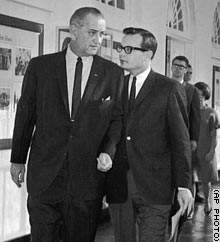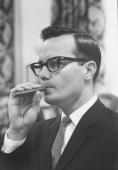|
The Moral Core of Bill Moyers
By Eve Berliner |
|
|
Lyndon Johnson and Bill Moyers, a potent union of power and destiny in the turbulent 1960's. |
Moyers: A passion for Brazilian cigars
|
|
The year 1960, Lyndon Baines Johnson sprawled in an exhausted sleep in the front seat of a campaign vehicle, his head slumped on the shoulder of a skinny young man in heavy black-rimmed glasses, the enormous physicality bearing down on him, as he tenaciously keeps talking on the car radio, issuing instructions, hovering on detail and running the three-ring circus. It was the Vice Presidential campaign of Lyndon Baines Johnson and Bill Moyers was twenty-six years of age. The quiet man and the colossus of Lyndon Johnson. They were two Texas longhorns with some kind of an intimate connection, an "umbilical cord" as Bill Moyers would put it; the bond that would run so deep. Perhaps it was the deep religiosity of Moyer's upbringing, his parent's gift to him, that touched a chord in Johnson, that deep moral imperative that goes to the core, that urges men to do good on this earth. In a sense, they were both preachers on the frontlines, Moyers, a Baptist Minister, Johnson, master of the Senate, with his own brand of sermonizing, both men moved by power, faith and the passion for things big. The old-time religion still burned. It began in 1948 when Billy Don Moyers, son of an East Texas dirt farmer, fourteen years of age, saw Lyndon Johnson in the flesh for the first time. As he recounted to Esquire Magazine in 1989: "It was 1948. Johnson was speaking in the Courthouse Square in Marshall, Texas. No microphone. No loudspeaker. Took his coat off. His tie was pulled back. His white shirt was glistening in the sun. And he was literally forcing himself physically on that audience of 3000 to 4000 people there on the east side of the square. I couldn't really hear him. I was in the back row. Fourteen years old. But I remember the sheer presence of the man. And I thought, 'That's what power is.'" The letter to the Senate Majority Leader in Washington was the instrument that brought them together. The year 1954, Bill now the top journalism student at North Texas University, his earnest communication to the Senator focused on the power of the youth vote. Johnson seized upon his instincts and immediately called Moyers to Washington for a job as a summer intern in his spacious Senate office. The young man began by addressing envelopes but before summer's end was in charge of Johnson's personal mail. The Great Persuader then persuaded Moyers to transfer to the University of Texas at Austin, offering him a job as assistant to the news editor for KTBC Radio and Television, the station owned by his wife, Lady Bird, and enabling Bill to marry his longtime sweetheart, Judith Suzanne Davidson. And yet, on the deepest levels of his being, Moyers remained torn by his religious calling. He was preaching at two small Baptist churches on alternate Sundays. It had been his parent's dream for him. With his Bachelor of Journalism degree in hand, and with the highest honors after compiling one of the best records in the history of the University of Texas School of Journalism, he made his decision. He would leave for the University of Edinburgh in Scotland as a Rotary International Fellow, and study moral philosophy. In 1957, he returned to Fort Worth, Texas and entered the Southwestern Theological Seminary where he earned his Bachelor of Divinity degree. Soon thereafter, a crisis of faith drove him back to Lyndon Johnson. He rejoined LBJ's staff as special assistant during the Vice Presidential campaign of 1960 and was in the thick of the action in the new Kennedy administration, until 1961, when the tantalizing dream of the Peace Corps had its nascent birth and he asked to resign and join the endeavor. Against Johson's strenuous objections, he departed the White House and flung himself into the development of the Peace Corps. He became the principal architect of its mission and work, drafting the necessary Congressional legislation, and ultimately becoming its deputy director. November 22, 1963. The assassination that destroyed the dream. Moyers was in Austin when he heard the terrible news that Kennedy had been shot. He immediately chartered a plane to Dallas and arrived at the airport just as Lyndon Johnson was to take the oath of office in the cabin of Air Force One, Mrs. Kennedy at his side, still wearing her blood-drenched pink suit. Barred from entering by a Secret Service agent, he scribbled a note to Johnson, "I'm here if you need me." Within seconds he was in the cabin to witness the swearing in. As the turmoil of the days unfolded, Bill Moyers would become Johnson's "second skin," his most profound advisor, bringing order to chaos, a liaison to the Kennedys, "The Young Man in Charge of Everything," as Time Magazine would proclaim. It was Moyers who developed the landmark Great Society legislation, prepared Presidential messages to Congress, and was chief speechwriter. He began to play a more serious role in foreign policy discussions. He was appointed White House Chief of Staff. In 1965, Bill Moyers was named White House press secretary, and he was held in the highest esteem by the White House press corps. Beneath the veneer of serenity and inner fortitude, life had begun to take its toll on Bill Moyers. He was plagued by a chronic stomach ulcer. The strain on him was severe. It had become a war government and Lyndon Johnson was intensifying America's military involvement in Southeast Asia. The domestic agenda was fading from the scene with the relentless descent into the quagmire of Vietnam. Finally, in deep disillusionment, the torment too much to bear, the relationship between Bill Moyers and Lyndon Johnson ended in a bitter rupture. He resigned in December of 1966 to become the publisher of Newsday. His "umbilical cord," Lyndon Johnson, never spoke to him again. * * * Under Moyer's tenure as publisher of Newsday, the newspaper won two Pulitzer Prizes and was honored with 33 major journalism awards. Newsday became a "writer's haven" with Nicholas Thimmesch, Washington Bureau chief, Pete Hamill, star columnist, Daniel Patrick Moynihan, contributing scathing sociological analyses of the inner city revolution, while the renowned novelist and Pulitzer Prize winner, Saul Bellow, covered the 1967 Mideast war. But increasingly, the nation was convulsed by the incendiary spectre of Vietnam. The newspaper endorsed the peace marches and the brave anti-war demonstrations and searched for extrication from the morass. It came to a head when owner Harry Guggenheim accused Moyers of "left wing sympathies," and sold his 51% interest in Newsday to the Times Mirror Company, a conservative monolithic publishing conglomerate. Moyers resigned. His brief three year tenure as publisher of a major suburban daily was over. Instead, he embarked on a 13,000 mile trip across America and wrote a book called "Listening to America: A Traveler Rediscovers His Country." His voyage of rediscovery became a national best seller. * * * Journeyman, quiet provocateur, explorer in realms unrealized, Bill Moyers has gone on to greatness. His long association with public television broadcasting, which began in 1970, opened new avenues of intellectual freedom and inquiry. The acclaimed Bill Moyers Journal, which aired on PBS through the 1970's and early 80's "epitomized public affairs broadcasting at its best," Saturday Review would state. Then came a decade at CBS News with Moyers, editor and chief correspondent for CBS Reports, creating powerful documentary investigations: "The Fire Next Door" and "The Vanishing Family: Crisis in Black America." - "one of the bravest TV documentaries ever made." [ Michael Novak, National Review, 1989] In 1986, Moyers and his wife founded their own independent production company, Public Affairs Television, Inc. which through the years has created more than 300 hours of searching, provocative and penetrating work, including, "A Walk Through the Twentieth Century with Bill Moyers," "Joseph Campbell and the Power of Myth," "The Secret Government," "Healing and the Mind," "A World of Ideas with Bill Moyers," "The Arab World," "The Language of Life: A Festival of Poets," and "Genesis: A Living Conversation." He has conversed with the greatest minds of the planet, discoursed on myth and evil and God and philosophy. The great turning point of his life was 1966: the death of his brother James and the parting with Johnson over the war. He has spent a life as a teacher and illuminator, erudite, deeply thoughtful, growing fiery and evangelical when he is slashing at the corrupt powers that be. And now, Bill Moyers, seventy years of age, is embarking on a new journey. He is leaving public television and "NOW", his acclaimed PBS series, at the conclusion of the November elections, in order to tackle the writing of a long-germinating memoir of Lyndon Baines Johnson. "That would make me a thief of his confidences," he said long ago when pressed by a publisher to write such a book. "Johnson spent hours and hours with me in unguarded moments. He could not have done so had he ever thought I would write what he was saying." But history beckons.
|
|

